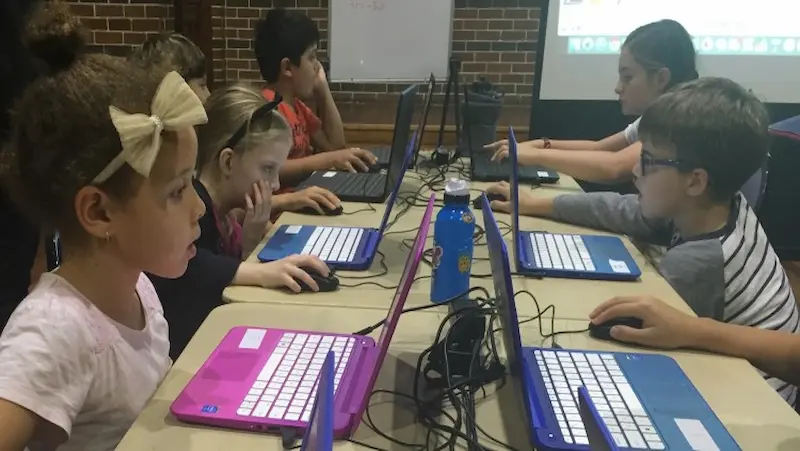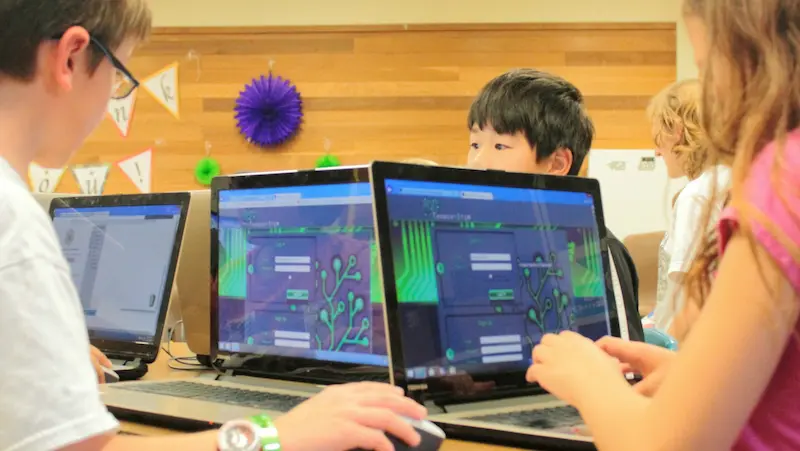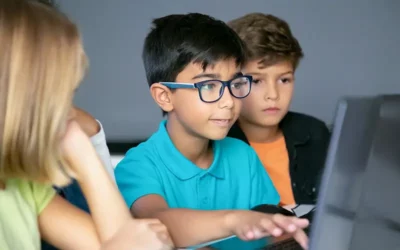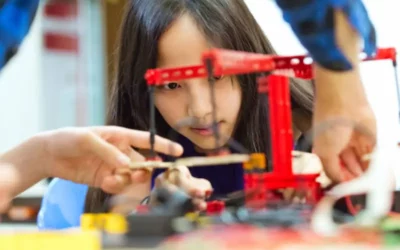Coding games for kids can be a powerful tool for boosting their STEM (Science, Technology, Engineering, and Mathematics) skills. In today’s increasingly digital world, coding has become an essential skill, and starting early can provide children with a strong foundation for future success. Code games designed specifically for kids offer an engaging and interactive way to introduce them to the world of programming, fostering creativity, problem-solving abilities, and logical thinking.
Table of contents
Introduction to Coding Games for Kids

In today’s digital age, coding for kids has become an essential skill to acquire. With technology permeating every aspect of our lives, understanding the fundamentals of coding can open up a world of opportunities for young minds. To make the learning process enjoyable and engaging, coding games for kids have gained immense popularity. These games combine the excitement of gaming with the educational benefits of coding, making it a win-win situation for both parents and children.
Coding games for kids are designed to introduce young learners to the basic principles of programming in a fun and interactive manner. They offer a hands-on experience that encourages creativity, problem-solving, and logical thinking. By providing a playful environment, these games stimulate curiosity and foster a love for coding from an early age. They can be accessed through various platforms such as coding app for kids, free coding websites for kids, or dedicated educational tools.
One of the main advantages of coding games is their ability to simplify complex concepts. Instead of overwhelming children with lines of code, these games break down programming concepts into bite-sized challenges that are easy to grasp. Through step-by-step instructions and visual cues, kids learn how to create algorithms, manipulate variables, and control characters or objects in the game. This approach empowers children to build their problem-solving skills gradually, boosting their confidence along the way.
Benefits of Coding Games for Kids

Coding games offer numerous benefits for kids, making them an excellent educational tool in today’s digital age. These games not only entertain children but also enhance their cognitive skills and foster creativity. Let’s explore some of the key benefits of coding games for kids.
Firstly, coding games help children develop critical thinking and problem-solving skills. They require kids to analyze complex situations, break them down into smaller components, and find logical solutions. By engaging in coding games, children learn to approach challenges strategically, think critically, and solve problems efficiently. These skills are valuable not only in coding but also in various aspects of life.
Secondly, coding games encourage creativity and foster innovation. Children have the freedom to create and experiment with different ideas and concepts while coding. They can design their characters, develop unique game mechanics, and explore innovative ways of solving problems. This process nurtures their creativity, imagination, and ability to think outside the box. Through coding games, kids learn that there are multiple solutions to a single problem, encouraging them to be innovative and resourceful.
Furthermore, coding games for kids promote logical reasoning and mathematical skills. Coding involves understanding and implementing logical sequences, patterns, and algorithms. By manipulating variables and conditions in coding games, children develop a solid foundation in logic and mathematics. They learn concepts like sequencing, loops, conditionals, and variables, which are fundamental to programming. These skills not only assist them in coding but also support their overall mathematical and analytical abilities.
In addition, coding games enhance teamwork and collaboration skills. Many coding games offer multiplayer modes, enabling children to work together towards a common goal. They learn to communicate, share ideas, delegate tasks, and collaborate effectively with their peers. By working as a team, children understand the importance of cooperation and develop essential social skills that are crucial in today’s interconnected world.
Moreover, coding games improve persistence and resilience in children. Coding is a trial-and-error process that requires patience and perseverance. Kids encounter challenges and bugs while coding games, but they learn to persist and find solutions. This process instills a growth mindset, where children understand that failures are stepping stones to success. They develop resilience, the ability to bounce back from setbacks, and the determination to overcome obstacles.
Popular Coding Games for Kids

There are many popular coding games for kids that can help them learn the basics of programming in a fun and engaging way. Here are a few of the most popular options:
- CodeCombat: CodeCombat is a browser-based game that teaches kids how to code by having them complete quests in a fantasy world. The game uses a visual programming language that makes it an easy kids coding language, and it offers a variety of levels to challenge learners of all skill levels.
- Scratch: Scratch is a free online platform that allows kids to create their own interactive stories, games, and animations using a block-based programming language. Scratch is a great way for kids to learn the basics of coding while also expressing their creativity.
- Tynker: Tynker is a subscription-based coding platform that offers a variety of games, tutorials, and activities for kids of all ages. Tynker’s games are designed to be fun and engaging, and they help kids learn important coding concepts like loops, variables, and conditional statements.
- Code.org: Code.org is a non-profit organization that offers a variety of free coding for kids with resources, including games, tutorials, and curriculums. Code.org’s games are designed to be fun and educational, and they cover a variety of coding topics.
- Minecraft: Minecraft is a popular sandbox game that allows players to build anything they can imagine. Minecraft can be used as a coding platform by using mods and plugins that allow players to create custom commands and scripts.
These are just a few of the many popular coding games for kids. There are many other great options available, so it’s important to find a game that your child will enjoy and that will challenge them at the right level.
How Coding Games Help Boost STEM Skills

Coding games are a great way to boost STEM skills in kids and adults alike. They can help develop critical thinking, problem-solving, and creativity skills, all of which are essential for success in STEM fields. Also, Participating in hands-on activities for kids in coding introduces young learners to the world of technology and programming.
Here are some of the ways that coding games can help boost STEM skills:
- Critical thinking: Coding games require players to think critically about how to solve problems. They often involve puzzles or challenges that require players to use logic and reasoning to find a solution. This helps develop the critical thinking skills that are essential for success in STEM fields.
- Problem-solving: Coding games also require players to be able to solve problems. This is because coding is all about finding solutions to problems. By playing coding games, players can learn how to break down problems into smaller, more manageable pieces, and then find solutions to those pieces. This is a valuable skill for anyone who wants to succeed in STEM fields.
- Creativity: Coding games can also help develop creativity skills. This is because coding is a creative process. Players need to be able to come up with new ideas and solutions to problems. By playing coding games, players can learn how to think outside the box and come up with creative solutions to problems. This is a valuable skill for anyone who wants to succeed in STEM fields.
In addition to these specific skills, coding games can also help develop general STEM skills such as:
- Logic: Coding games require players to use logic to solve problems. This helps develop the logical thinking skills that are essential for success in STEM fields.
- Algorithms: Coding games often involve the use of algorithms. Algorithms are a set of instructions that are used to solve a problem. By playing coding games, players can learn how to create and use algorithms. This is a valuable skill for anyone who wants to succeed in STEM fields.
- Data structures: Coding games often involve the use of data structures. Data structures are a way of organizing data so that it can be easily accessed and manipulated. By playing coding games, players can learn about different data structures and how to use them. This is a valuable skill for anyone who wants to succeed in STEM fields.
Coding games are a fun and engaging way to learn STEM skills. They can be used to supplement traditional STEM education or to provide a fun and engaging way for kids and adults to learn STEM skills on their own. Integrating math games for kids into coding lessons encourages students to apply mathematical principles to solve coding challenges.
If you are looking for a way to boost your STEM skills, coding games are a great option. There are many different coding games available, so you can find one that is right for you. And, because coding games are fun and engaging, you will be more likely to stick with them and learn the skills that you need.
Choosing the Right Coding Games for Your Child

Coding is a valuable skill that can open up a world of possibilities for your child. It can help them develop problem-solving skills, critical thinking skills, and creativity. It can also lead to future career opportunities in tech. Online games for kids in coding provide an interactive platform for young learners to practice coding concepts and improve their programming skills.
There are many different coding games available, so it can be tough to know which ones are right for your child. Here are a few factors to consider when making your decision:
- Age appropriateness: Some coding games are designed for younger children, while others are more challenging and suited for older kids. Choose a game that is appropriate for your child’s age and skill level.
- Learning objectives: What do you hope your child will learn from playing the game? Some games focus on teaching basic coding concepts, while others focus on more advanced topics. Choose a game that aligns with your child’s learning goals.
- Fun factor: Coding games should be fun! If your child doesn’t enjoy playing the game, they’re less likely to stick with it and learn anything. Choose a game that is engaging and challenging, but also enjoyable.
Here are a few additional tips for choosing coding games for your child:
- Talk to your child about their interests. What do they like to do for fun? What are they interested in learning about? Choose coding games that align with your child’s interests.
- Let your child try out different games. There are many different coding games available, so it’s a good idea to let your child try out a few different games before you decide which one is right for them.
- Be patient. Learning to code takes time and practice. Don’t get discouraged if your child doesn’t learn everything right away. Just keep encouraging them to keep practicing.
Coding for kids is a valuable skill that can open up a world of possibilities for your child. With so many great coding games available, there’s no reason why your child can’t learn to code and have fun at the same time.
How to Get Your Child Started with Coding Games

Coding games are a great way to introduce children to the world of computer programming. They are fun, engaging, and can help children learn important problem-solving skills. Memory games for kids in coding help improve their logical thinking and pattern recognition skills. If you are interested in getting your child started with coding games, here are a few tips:
- Start with the basics. There are many coding games available for children of all ages. If your child is just starting out, choose a game that is designed for beginners. These games will typically use simple coding concepts and will be easy for children to understand.
- Make it fun. The most important thing is to make coding games fun for your child. If they are not enjoying themselves, they are less likely to stick with it. Choose games that are age-appropriate and that your child will find interesting.
- Be patient. Learning to code takes time and practice. Don’t get discouraged if your child doesn’t understand everything right away. Just keep practicing and they will eventually get the hang of it.
- Help when needed. If your child is struggling with a particular coding concept, offer to help them. But don’t do it all for them! The goal is for them to learn how to code, so they need to be able to do it on their own.
- Encourage creativity. Coding games can be a great way for children to express their creativity. Encourage them to experiment with different coding concepts and to create their own games.
With a little patience and encouragement, your child can learn to code and have a lot of fun doing it. Here are a few of the basics of the best coding programs for kids, including some of the best coding games for kids:
Conclusion
In conclusion, code games for kids have proven to be highly effective in boosting their STEM skills. By engaging children in a fun and interactive way, these games provide a foundation for understanding and applying coding principles. As they immerse themselves in the world of programming, children develop problem-solving abilities, critical thinking skills, and creativity.
One of the key benefits of code games is their ability to foster a growth mindset in children. By presenting challenges and encouraging experimentation, these games teach kids that failure is a natural part of the learning process. They learn to persevere, iterate, and improve their solutions, which are essential skills not only in coding but also in various aspects of life.
Furthermore, code games help children develop logical reasoning skills. As they break down complex problems into smaller, more manageable steps, kids learn to analyze situations and think critically. This analytical thinking translates into other areas of their education and future careers, equipping them with a valuable skill set that will be in demand in the increasingly technology-driven world.
BrightCHAMPS provides a fun and interactive platform for kids to learn coding concepts. With a range of age-appropriate courses for kids aged 6-14 years. Kids can progress at their own pace and develop their coding skills through engaging activities and projects. The platform also encourages creativity and problem-solving, helping kids to develop critical thinking skills that are valuable in many areas of life. If you are willing to learn coding with a high-level teacher while having fun.
Frequently Asked Questions
Code games provide interactive and engaging experiences that teach kids coding concepts through hands-on practice and problem-solving challenges.
Code games are suitable for a wide age range, from young children to teenagers, with age-appropriate game content and difficulty levels.
Playing code games enhances logical thinking, problem-solving skills, creativity, and computational thinking abilities in kids.
Popular code games for kids include Scratch, Code.org, Minecraft: Education Edition, and Tynker.
Code games serve as a fun and effective introduction to coding, allowing kids to explore programming concepts in an enjoyable and intuitive way.
Yes, kids can learn to code by playing code games. These games often introduce coding concepts in a fun and interactive way, helping children develop problem-solving skills and a basic understanding of programming principles.
Kids can learn coding concepts like sequencing, loops, conditionals, variables, and problem-solving from code games. These games provide a fun and interactive way for children to engage with coding and develop essential computational thinking skills.
Yes, there are many free code games available for kids, such as Scratch, Code.org, Lightbot, and Algobot.
Parents can support their kids’ coding journey by providing guidance, encouragement, and resources, and participating in coding activities together.
When choosing code games, consider the child’s age, interests, and skill level, as well as the game’s educational content and interactive features.
Safety concerns with code games include monitoring online interactions, ensuring appropriate content, and protecting personal information.
Yes, code games can be used in the classroom to teach coding. They provide an interactive and engaging learning experience, allowing students to practice coding concepts while having fun and developing problem-solving skills.


 We are an army of educators and passionate learners from BrightChamps family, committed to providing free learning resources to kids, parents & students.
We are an army of educators and passionate learners from BrightChamps family, committed to providing free learning resources to kids, parents & students.

























